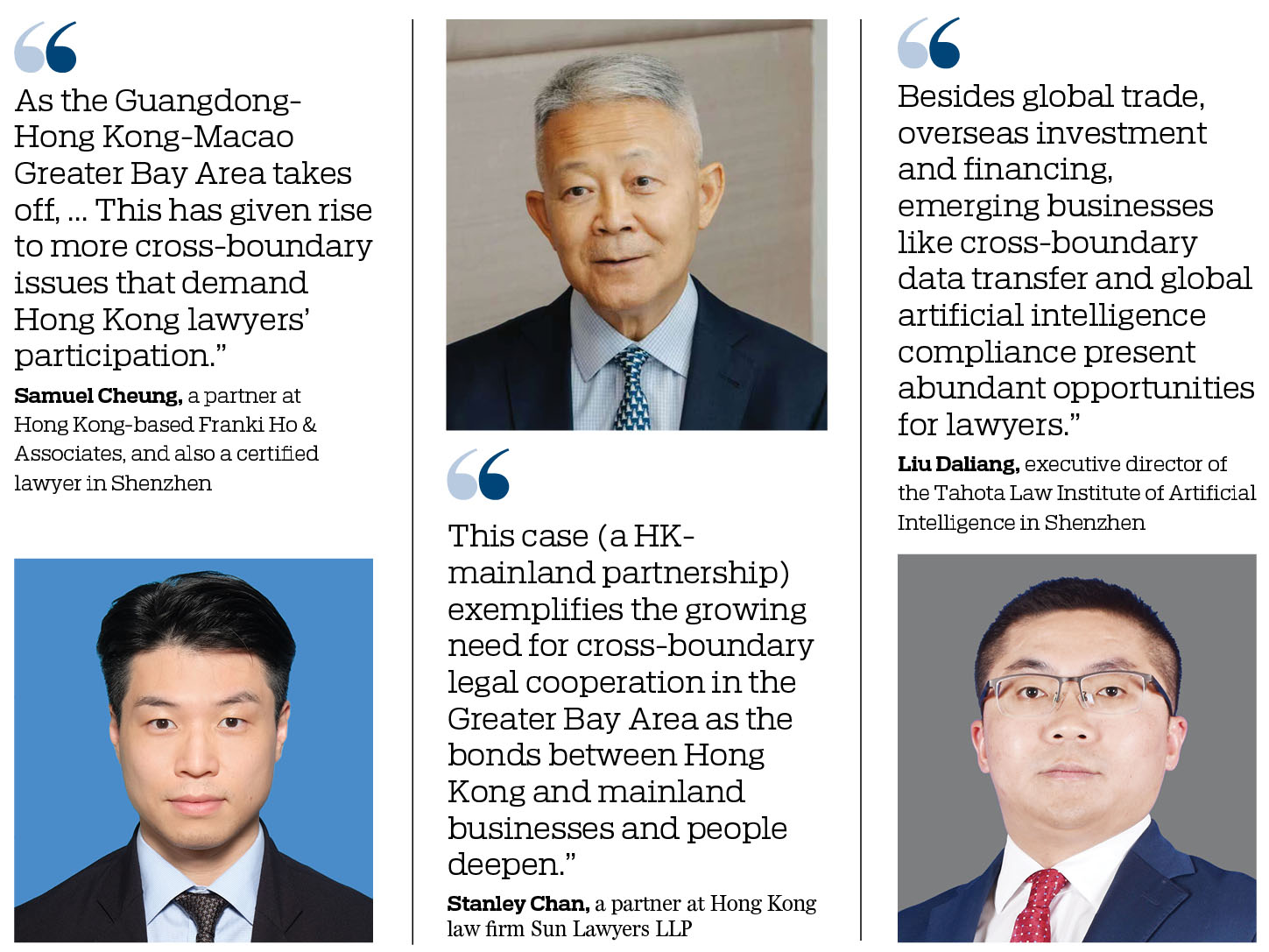The Greater Bay Area has fostered closer economic and social exchanges between the Chinese mainland and Hong Kong, creating enormous business potential, with lawyers riding the wave of demand for cross-boundary legal services. Zhou Mo reports from Shenzhen.

Hong Kong lawyer Samuel Cheung has a lot to be thankful for after starting his practice in Shenzhen, although he often finds himself having to navigate the complexities of cross-boundary legal issues.
Clients from diverse backgrounds are making a beeline for his advice on matters ranging from corporate law, and mergers and acquisitions to intellectual property.
“As the Guangdong-Hong Kong-Macao Greater Bay Area takes off, business activities between the Hong Kong Special Administrative Region and the Chinese mainland have gone up by leaps and bounds. So have people-to-people ties. This has given rise to more cross-boundary issues that demand Hong Kong lawyers’ participation,” says Cheung, a partner at Hong Kong-based Franki Ho & Associates, and also a certified lawyer in Shenzhen.
READ MORE: HK launches training academy to strengthen legal talent cultivation
As Cheung sat in his Hong Kong office in Sheung Wan, Hong Kong Island, reviewing documents concerning a complex cross-boundary dispute that embroiled a tech company two months ago, Guangzhou-based law firm Zhuoxin was hosting a grand opening ceremony for its Hong Kong office a stone’s throw away in Central District. It is among a string of mainland law firms in the Greater Bay Area that set up shop in the special administrative region last year.
Two-way interaction and exchanges in the legal field between Hong Kong and the Chinese mainland are increasing. As more Hong Kong lawyers set their sights north, leveraging their professional expertise in dealing with cross-boundary cases under a program that allows them to practice in the nine Guangdong cities in the Greater Bay Area, mainland law firms are heading in the opposite direction. They are extending their footprint in the HKSAR, offering legal advice to Chinese enterprises on the global expansion trail.
Since the State Council launched a program in 2020 allowing eligible Hong Kong and Macao lawyers to provide legal services in the Greater Bay Area’s nine mainland cities after they have passed an examination and obtained their practice certificate, the number of eligible legal practitioners has proliferated. More than 1,800 lawyers from the two SARs had sat for the exam, and 482 had qualified as of September.

Bracing for new opportunities
Stanley Chan is among the group of Hong Kong lawyers who can practice in the nine mainland cities. It has opened up enormous opportunities for him to gain a deeper understanding of mainland enterprises and people, and work with his peers across the boundary.
Chan, a partner at Hong Kong law firm Sun Lawyers LLP, has dealt with dozens of cross-boundary cases so far. His clients have included not only large companies in the Greater Bay Area, but also small and medium-sized companies, startups and individuals with close ties to Hong Kong. The range of legal services offered has diversified from being mainly related to cross-boundary investments and financing to dispute resolution, inheritance, divorce, and real estate.
Chan recalls that while working in Shanghai decades ago, there were few lawyers like him. Cross-boundary work involving Hong Kong legal professionals was almost non-existent. “Now, it’s so common. Collaboration between Hong Kong and mainland lawyers is gaining momentum,” he says.
He remembers having dealt with a vexing case in which cooperation between Hong Kong and mainland lawyers was crucial to reaching a settlement. It centered on a deceased Hong Kong individual with substantial assets, including five real-estate properties on the mainland, who left behind a large family with multiple legal heirs living on the mainland, Hong Kong, Macao and Australia.
In the absence of a will, the mainland’s intestate succession law applied, dictating that inheritance distribution is based on familial relationships. But the situation was exacerbated by the fact that some of the heirs themselves had passed away, raising complications over their children’s rights to inherit the assets.
Legal teams from Hong Kong and the mainland teamed up to address the legal challenges. Hong Kong lawyers liaised with the family members to ensure that their rights were protected under Hong Kong law. Mainland lawyers handled the court proceedings, initiating a lawsuit to establish the identity of each of the heirs and determine their respective inheritance shares. The joint efforts led to a smooth resolution of the problem.
“This case exemplifies the growing need for cross-boundary legal cooperation in the Greater Bay Area as the bonds between Hong Kong and mainland businesses and people deepen,” says Chan.
READ MORE: Hong Kong’s pivotal role in global trade reaffirmed amid headwinds
According to the Law Society of Hong Kong, 88 law firms from the SAR had set up offices on the mainland by April. Twenty of them have a representative body in the Greater Bay Area, mainly in Guangzhou, Shenzhen and Zhuhai.
Hong Kong law firms’ operations in the Greater Bay Area focus mainly on resolving cross-boundary disputes and handling foreign-related commercial activities, according to a research report jointly published by the LSHK and Guangzhou’s Sun Yat-sen University. Compared with their mainland counterparts, Hong Kong lawyers enjoy comparative advantages in dealing with these issues, given their proficiency in English and familiarity with foreign laws and the common law system.
The report also showed that 33.3 percent of the Greater Bay Area enterprises polled have frequent contact with Hong Kong lawyers. As to why they chose Hong Kong lawyers for legal services, 95 percent of the respondents said Hong Kong lawyers are more familiar with foreign laws and customs, while 65 percent said they are able to offer cross-boundary legal services.
Cheung has gained a thorough understanding of the complementary advantages of lawyers from both regions while working with his mainland counterparts on cross-boundary cases, such as due diligence, inheritance, and reciprocal enforcement of judgment.
He notes that Hong Kong lawyers are proficient in laws relating to international trade and compliance requirements for cross-boundary operations, enabling them to provide strategic consulting and design frameworks for international cooperation. Mainland lawyers are familiar with the operational mechanisms of the mainland market and can efficiently handle the daily legal affairs of domestic enterprises, ensuring smooth integration of business activities between the two regions.
“Such cooperation not only helps mainland companies to expand globally, but also provides valuable practical experience for the integrated development of legal industries in Hong Kong and on the mainland,” says Cheung.
As Hong Kong lawyers play an increasingly active role in the Greater Bay Area, they do encounter problems. “One of the major challenges facing us working on the mainland is the difference in the legal cultures between the two places,” notes Chan. In Hong Kong, clients often engage lawyers well in advance in dealing with any legal issue, handling the initial tasks and mitigating risks. Mainland clients are accustomed to seeking legal advice much later. “This disparity in practice requires Hong Kong lawyers to realign their strategies to better align with the fast-paced demand of their mainland clients,” he says.
Another stumbling block is that Hong Kong lawyers lack the knowledge concerning legal services in the Greater Bay Area. The report by the LSHK and SYU pointed out that only 7.6 percent of Hong Kong lawyers are well equipped with such knowledge, such as laws, regulations and policies in the Greater Bay Area.
The different legal fee structures on both sides are also an obstacle, notes Cheung, with some mainland businesses complaining that the hourly billing model used by Hong Kong lawyers makes it difficult for them to assess the costs involved. About 82 percent of the respondents surveyed cited relatively high legal fees for not using Hong Kong lawyers’ services.
Driving legal expansion
Mainland enterprises are accelerating their pace of internationalization in a bid to seek new growth engines and drive their growth. Such expansion efforts are particularly active in the Greater Bay Area, the country’s manufacturing and innovation powerhouse with an export-oriented economy.
According to a research report by the Chinese General Chamber of Commerce, the One Country Two Systems Research Institute and KPMG in October, the value of overseas assets of 14 Greater Bay Area enterprises on the 2023 top 100 Chinese multinational corporations list reached 2.3 trillion yuan ($313.72 billion) — up 8.6 percent year-on-year. Their combined operating revenue abroad rose 16 percent on a yearly basis to 857.6 billion yuan in the same year.
The wave has prompted more law firms in the Greater Bay Area’s mainland cities to open offices in Hong Kong to better serve their client’s international drive. Kingpound, Wang Jing & GH and Zhuoxin — three law firms based in Guangzhou — established their presence in Hong Kong last year. They were joined by Beijing-based Docvit Law Firm, Shanghai-based Everbright and others in the same year.
ALSO READ: E-platform to enhance GBA collaboration in dispute resolution
According to the LSHK’s official website, 36 out of 85 nonlocal law firms in Hong Kong were from the mainland as of Jan 9, accounting for 42 percent of the total.
“As mainland firms intensify their ‘go global’ push, they demand a range of legal services relating to company registration, opening of bank accounts, overseas capital flow, and cross-boundary data transfer. These needs have prodded mainland law firms to expand their footprint across the boundary to provide better legal support,” says Liu Daliang, executive director of the Tahota Law Institute of Artificial Intelligence in Shenzhen.
Being the “superconnector” between the mainland and the world, Hong Kong is the gateway for mainland enterprises in exploring overseas markets. “To facilitate international business operation, mainland companies prefer legal service providers in partnership with Hong Kong lawyers, offering them a steppingstone to expand their business to the financial hub,” says Liu.
As the mainland’s legal services sector strives for “blue sea” markets with promising growth potential, he believes that “going out” is essential.
“Besides global trade, overseas investment and financing, emerging businesses like cross-boundary data transfer and global artificial intelligence compliance present abundant opportunities for lawyers,” he says.
Contact the writer at sally@chinadailyhk.com


